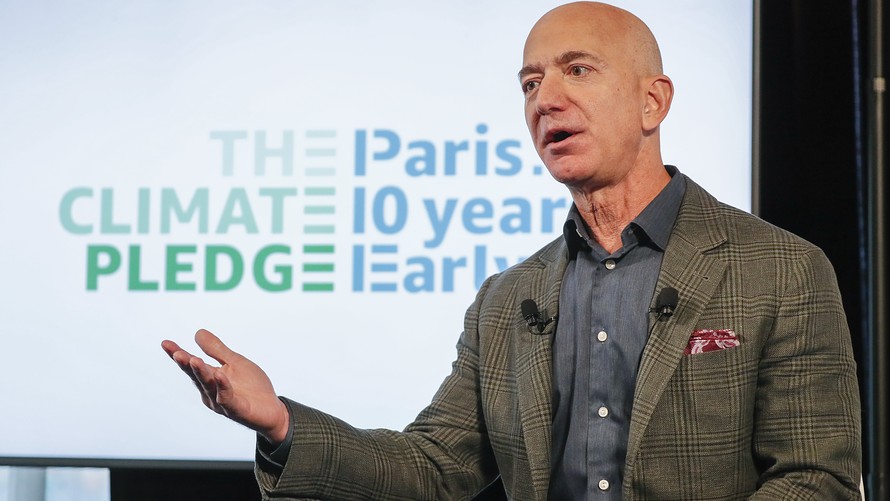
By Tonya Garcia and Rachel Koning Beals
Delivery giant Amazon on Thursday set a goal to meet Paris Climate Agreement objectives 10 years early, with a pledge to be carbon neutral by 2040, even for its Prime one-day shipping service.
Amazon will also work toward using 100% renewable energy by 2030 and has placed a big order for electric vans from a Midwest company, Rivian, which the online retailer took a $440 million stake in.
The ambitious plan by Amazon makes it the first signatory of the Climate Pledge, which it has newly formed with a group called Global Optimism. The Climate Pledge calls on its participants to be at net-zero carbon across their businesses a decade ahead of the Paris Agreement’s goal of 2050.
“We’re done being in the middle of the herd on this issue — we’ve decided to use our size and scale to make a difference,” said Jeff Bezos, Amazon founder and CEO. “If a company with as much physical infrastructure as Amazon — which delivers more than 10 billion items a year — can meet the Paris Agreement 10 years early, then any company can.”
The pledge comes in the days leading up to the much-publicized United Nations “climate crisis” meeting in New York on Sept. 23. That gathering has encouraged a flurry of activism, including another walkout on Friday by students and employees of big companies, Amazon among them, to bring attention to the climate issue.
The pledge comes in the days leading up to the much-publicized United Nations “climate crisis” meeting in New York on Sept. 23. That gathering has encouraged a flurry of activism, including another walkout on Friday by students and employees of big companies, Amazon among them, to bring attention to the climate issue.
“Amazon’s goal of net-zero carbon by 2040 is ambitious but achievable,” said Sue Reid, vice president of climate and clean energy at Ceres. “Many of the solutions, like switching to renewable energy and amping up energy efficiency, are no-regrets strategies that can bring near-term and long-term cost savings.” She notes that light-duty electric vehicles already are cheaper on a total-cost-of-ownership basis, and are rapidly approaching cost parity with traditional internal combustion engine vehicles right at the time of purchase. Amazon with the size of its purchase will have economies of scale on its side.
Amazon said in July that this year’s two-day Prime Day shopping event surpassed its Black Friday and Cyber Monday totals combined. More than 175 million items were purchased for Prime Day.
Now, with what it’s calling Amazon Shipment Zero, the retailer thinks it can eventually make all shipments net-zero carbon, and be at 50% net-zero carbon by 2030, the company said Thursday. Getting there will include use of its existing sustainable packaging initiatives like Frustration-Free Packaging and Ship-in-Own-Container, which have reduced packaging waste by 25% since 2015.
Amazon was featured recently in efforts by shareholders and the funds that represent them to put pressure on companies on environmental, social and governance (ESG) topics. Shareholders increasingly want Amazon to be more transparent about its fossil-fuel use.
“Despite investors’ efforts, it’s incredible to see that it was the company’s employees who were finally able to draw a duel. However, it will be up to all of us — from Amazon’s employees to its business partners to governments, investors and yes, even consumers — to ensure that the other side of Amazon’s history, the one that’s yet to play out, is met with real investments and initiatives to create the solutions needed to achieve such significant goals,” said Donofrio.
Amazon is now pledging to reach 80% renewable energy by 2024 and 100% renewable energy by 2030 on its path to net zero carbon by 2040.
It has already made investments that could change the way it delivers, including $440 million in Michigan-based, and Illinois-built, Rivian emissions-free electric vehicles. Amazon on Thursday said it has ordered 100,000 electric delivery vehicles from Rivian, the largest order ever of electric delivery vehicles, with vans starting to deliver packages to customers in 2021. Amazon plans to have 10,000 electric vans on the road as early as 2022 and all 100,000 vehicles on the road by 2030, saving 4 million metric tons of carbon per year by 2030, it says.
”Amazon’s size cuts both ways. On one hand, as one of the world’s largest companies it has considerable resources and capacity — including a robust in-house sustainability team — that can enable ambitious climate action,” said Reid of Ceres. “On the other hand, the company’s sheer size and breadth add complexities that must be addressed, for example with regard to addressing indirect emissions from operations and products that it doesn’t fully control.”